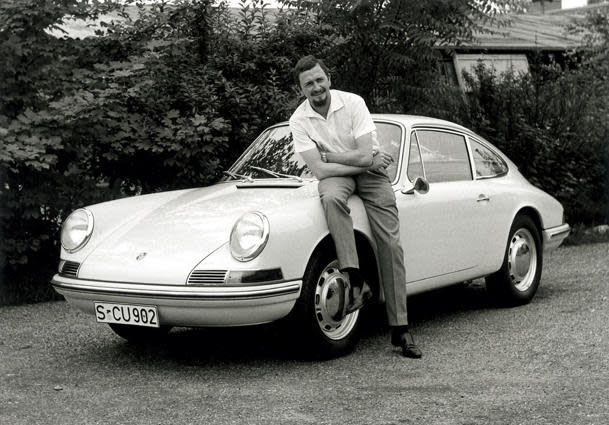Ferdinand Alexander Porsche, designer of the Porsche 911, dies at 76

Ferdinand Alexander Porsche and the 911
For a rich kid kicked out of design school, Ferdinand Alexander Porsche created one of the greatest legacies in automotive design with the Porsche 911 — one that will survive far beyond Porsche’s death today at the age of 76.
The son of company founder Ferry Porsche, F.A. or “Butzi” as he was known spent most of his career at his eponymous firm Porsche Design, where he oversaw the styling of thousands of products from watches to yachts, many with the tag “Designed by F.A. Porsche.”
But it’s the 911’s emergence in 1964, when Butzi Porsche was just 25 years old, that made him a historic figure. While his father and grandfather had been famous German engineers — the original Ferdinand Porsche engineered the first Volkswagen Beetle — F.A. Porsche chose to study design. A year after enrolling in a prestigious school, Porsche was in his own words “kicked out,” and took at job at his father’s fledging car business in 1957.
At the time, Ferry Porsche had created the successful Porsche 356, but needed a follow-up model. He set the car’s basic layout —a rear engine, a short wheelbase for agile handing — but pushed the designers and engineers to fashion a more sporting look than the men who built the Beetle had produced so far.
Prowling the auto shows of Europe, F.A. Porsche formed an idea of how the car should look as a smooth, curving fastback, rejecting the flat angles popular in American cars of the era. “I just think you start creating edges when the body of a car is bad…they are lines that support something that ties the designer down,” Porsche would say years later.
The new car’s design spurred a dispute with the older designers in Ferry Porsche’s shop, to such a degree Ferry went around them, taking his son’s blueprints to the body fabricator. The first production-ready model, called the 901, appeared at the Frankfurt Auto Show in September 1964, and after Peugeot objected to the name, Porsche changed it to 911. Despite the timelessness of the 911’s shape, F.A. Porsche believed his greatest design came a few years later, with the Porsche 904 race car.
When the company went public in 1971, the Porsche family withdrew from management roles — although F.A. Porsche would remain a presence on the company’s board and in its design studios. “He established a design culture in our company that has shaped our sports cars to this very day,” said Matthias Müller, President and Chief Executive Officer of Porsche AG. “His philosophy of good design is a legacy to us that we will honor for all time.”






